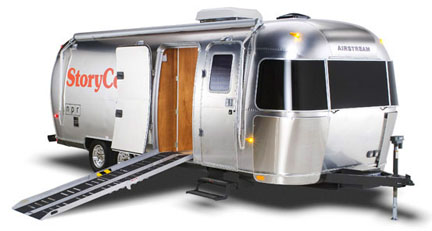
|
May 24, 2007 |
StoryCorps National Oral History Project to Record Rhode Islanders
StoryCorps, a national oral history and storytelling project, will stop in Providence June 7–30, 2007, to record the voices and stories of Rhode Islanders. Their traveling studio – the StoryBooth – will be located in the park at Kennedy Plaza in downtown Providence. The public is invited to make reservations. | |||
|
Brown University Home |
PROVIDENCE, R.I. [Brown University] — StoryCorps, the Peabody award-winning project to create and preserve an oral history of America, will stop in Providence June 7-30, 2007, to record the voices and stories of Rhode Islanders. StoryCorps RI, based at the John Nicholas Brown Center for the Study of American Civilization at Brown University, is the designated local partner for StoryCorps’ Rhode Island visit. 
StoryCorps was created by award-winning radio documentary producer and MacArthur Fellowship recipient Dave Isay. The project arranges for mobile recording studios – called StoryBooths – to travel to every corner of the United States and document the stories of ordinary people living in America today. To date, the StoryCorps tour has visited 60 towns and cities in 39 states and has collected more than 10,000 stories. “We are proud to partner with StoryCorps as it works to gather and preserve the life stories of everyday Rhode Islanders,” said Steven Lubar, professor of American civilization and director of the John Nicholas Brown Center for the Study of American Civilization, Brown’s center for public humanities. “The project’s philosophy and spirit are perfectly aligned with the mission of Brown’s Public Humanities Program, as it connects the public with history, art and culture.” At the StoryBooth, participants record interviews in pairs, oftentimes with friends or loved ones. A trained facilitator guides the participants through the interview process and handles the technical aspects of the recording. At the end of a 40-minute session, the participants walk away with a CD of their interview. With the permission of participants, a second copy will be sent to the American Folklife Center’s archives at the Library of Congress, where it becomes part of a digital archive. Additionally, select stories may air nationally on NPR’s Morning Edition, the most-listened-to morning radio program in the country, each Friday. StoryCorps interviews are also available by podcast at www.npr.org. Graduate students in the Public Humanities program have partnered with community organizations across the state in an effort to recruit interview participants who represent the broadest possible spectrum of Rhode Islanders’ experiences. The John Nicholas Brown Center (JNBC) will house an archive of all the interviews recorded in Providence. Organizers are developing plans for a legacy project that will allow for ongoing public access to the stories. For its stop in Rhode Island, the StoryCorps mobile StoryBooth will be set up in the park at Kennedy Plaza in downtown Providence. To make a reservation, visit the StoryCorps Web site at www.storycorps.net or call (800) 850-4406. Additional reservations will become open to the public once the booth arrives. Approximately 126 interview slots will be available. StoryCorps’ national sponsor is AT&T; MobileBooths is sponsored nationally by the Corporation for Public Broadcasting and National Public Radio. StoryCorps RI is co-directed by Deborah Abramson, Stephanie Fortunato, and Julia Lazarus, all graduate students in the Public Humanities Program at Brown. For more information, visit www.storycorpsri.net. Brown University’s Public Humanities Program, a program of the John Nicholas Brown Center and the American Civilization Department, trains students to become interpreters of the humanities to the public. It provides the knowledge and skills needed for jobs in museums, historical societies, state and federal humanities and cultural resource agencies, and historic preservation and community cultural development organizations. The graduates of this program bridge the gap between the university and the community, sharing and merging the expertise, experience and ways of knowing of humanities scholars and the public to build a new, broadly based understanding of culture and community. For more information, see www.brown.edu/jnbc. Editors: Brown University has a fiber link television studio available for domestic and international live and taped interviews, and maintains an ISDN line for radio interviews. For more information, call (401) 863-2476. ###### | |||